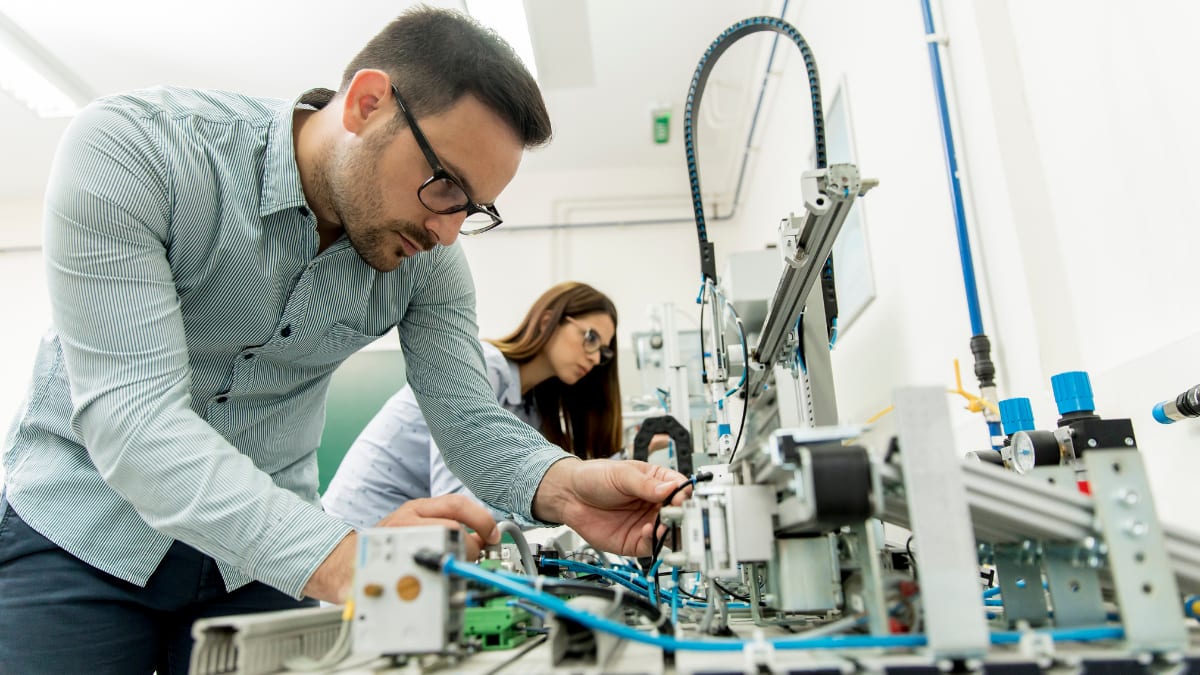America’s 15 Most Technologically Advanced Colleges

Key Takeaways
- The pandemic prompted educational institutions to embrace technology as a transformative learning tool to create an inclusive, accessible environment that empowers educators and learners in the digital age.
- Despite the numerous benefits to the student experience, technology integration in education also faces several challenges.
- The highlighted colleges are recognized for offering students unparalleled research opportunities that prepare them for the future.
Most Technologically Advanced Colleges
- Harvard University
- Columbia University
- Stanford University
- Princeton University
- Massachusetts Institute of Technology
- Cornell University
- University of California, Los Angeles
- California Institute of Technology
- University of Southern California
- Carnegie Mellon University
- Harvard University
- Columbia University
- Stanford University
- Princeton University
- Massachusetts Institute of Technology
- Cornell University
- University of California, Los Angeles
- California Institute of Technology
- University of Southern California
- Carnegie Mellon University
- Arizona State University 90%
- Georgia State University 67%
- Colorado School of Mines 58%
- Purdue University 53%
- Georgia Tech 17%
- University of Southern California 12%
- Carnegie Mellon University 11%
- University of California, Los Angeles 9%
- Cornell University 7%
- Princeton University 6%
- Georgia State University 26 to 1
- Georgia Tech 19 to 1
- Arizona State University 19 to 1
- University of California, Los Angeles 18 to 1
- Colorado School of Mines 17 to 1
- Purdue University 14 to 1
- Cornell University 9 to 1
- University of Southern California 9 to 1
- Harvard University 7 to 1
- Columbia University 6 to 1
- Columbia University $66,139
- University of Southern California $64,726
- Cornell University $63,200
- Carnegie Mellon University $61,344
- California Institute of Technology $60,864
- Stanford University $58,416
- Massachusetts Institute of Technology $57,986
- Princeton University $57,410
- Harvard University $57,261
- Colorado School of Mines $17,520
- University of Southern California $63,468
- California Institute of Technology $58,479
- Massachusetts Institute of Technology $57,590
- Princeton University $57,410
- Stanford University $56,487
- Harvard University $52,456
- Columbia University $52,016
- Carnegie Mellon University $47,629
- Cornell University $29,500
- Colorado School of Mines $17,676
- Colorado School of Mines
- Georgia State University
- Georgia Tech
- Arizona State University
- Purdue University
- Carnegie Mellon University
- University of Southern California
- California Institute of Technology
- University of California, Los Angeles
- Cornell University
- Colorado School of Mines
- Georgia State University
- Georgia Tech
- Arizona State University
- Purdue University
- Carnegie Mellon University
- University of Southern California
- California Institute of Technology
- University of California, Los Angeles
- Cornell University
- California Institute of Technology 3%
- Harvard University 3%
- Massachusetts Institute of Technology 4%
- Columbia University 4%
- Stanford University 4%
- Princeton University 6%
- Cornell University 7%
- University of California, Los Angeles 9%
- Carnegie Mellon University 11%
- University of Southern California 12%
- Massachusetts Institute of Technology 3 to 1
- California Institute of Technology 3 to 1
- Carnegie Mellon University 5 to 1
- Princeton University 5 to 1
- Stanford University 5 to 1
- Columbia University 6 to 1
- Harvard University 7 to 1
- Cornell University 9 to 1
- University of Southern California 9 to 1
- Purdue University 14 to 1
- Georgia State University $7,158
- Purdue University $9,718
- Georgia Tech $10,258
- Arizona State University $10,978
- University of California, Los Angeles $11,564
- Colorado School of Mines $17,520
- Harvard University $57,261
- Princeton University $57,410
- Massachusetts Institute of Technology $57,986
- Stanford University $58,416
- Georgia State University $7,164
- Purdue University $9,718
- University of California, Los Angeles $11,700
- Arizona State University $12,014
- Georgia Tech $14,064
- Colorado School of Mines $17,676
- Cornell University $29,500
- Carnegie Mellon University $47,629
- Columbia University $52,016
- Harvard University $52,456
2025 Ranking Update
Our Influence Ranking Engine™ leverages machine learning to track the real-world influence of colleges and universities over time. Below you’ll see which schools gained or lost ground for the 2025 school year.
While there were no changes to our ranking of the most technologically advanced colleges for 2025, many of the colleges in our ranking made significant improvements for this school year.
Columbia University has made several notable improvements for the 2025 school year that will appeal to students interested in technological advancements. One major initiative is the launch of the Columbia Center for Artificial Intelligence Technology (CAIT), which aims to advance AI research and development in collaboration with Amazon. This partnership focuses on applying AI to solve societal challenges while contributing to the growing AI ecosystem in New York City. Furthermore, Columbia’s cybersecurity initiatives, supported by a $12 million collaboration with Google, are expanding research and educational opportunities in this critical field.
Going into the 2025 school year, MIT has made several advancements that will appeal to students seeking a technologically advanced education. One significant achievement is MIT’s progress in fusion energy research, where the use of high-temperature superconductors has enabled the development of more efficient, compact fusion reactors. This breakthrough in magnetic field technology is poised to accelerate the journey towards sustainable fusion power.
These technologically advanced universities stand at the forefront of progress, spearheading groundbreaking technological advancements and housing state-of-the-art research centers. With a commitment to advanced technology, these institutions offer unparalleled research opportunities and boast online learning programs that prepare students for the future.

Featured Programs
15 Most Technologically Advanced Colleges in America
Although the most technologically advanced college can be subjective and prone to change, some prestigious universities with recognized cutting-edge technology programs include Stanford University, MIT, and CalTech.
With their world-class faculty and staff and advanced research facilities, these universities have continuously remained at the forefront of technological breakthroughs. They have a reputation as industry leaders thanks to their dedication to innovation and pushing the limits of technology.
Surprisingly, Yale University is not one of the most technologically advanced universities. Although Yale has excellent science and engineering degree programs, the university is more prominent in the arts and music rather than technology.
- #1 Top Schools that Offer Free Master's Degrees Online #1 50 Best Colleges and Universities Ranked for Undergrads in 2026 #1 Online Colleges with the Most Generous Financial Aid in 2025 #1 Best Universities in the World 2025
Tuition + fees
$57K
Acceptance
3%
Graduation
98%
Student body
39K
Median SAT/ACT
1535/35
Career Outlook for degree at Harvard University
Cost of Degree: $59,076Expenses: $27,629Starting Salary: $139,100Cost Recoup Time: 12 yearsPaid back at 15% of annual salaryHarvard University is a popular Ivy League that stands out for its degree programs and courses that emphasize technological innovation. Harvard has established itself as a pioneer in AI and machine learning research and education, acknowledging the revolutionary potential of AI. The Harvard curriculum prepares graduates for the development of AI technologies through academic principles and practical experience.
What we love about Harvard University:
Harvard University has very active research efforts. Much of the research completed at Harvard has groundbreaking results and motivates students to take part and commit as these can train them to become the bright people of tomorrow.
Harvard University is ideal for students who:
Wants to be a part of a community of talented and bright students.
Harvard University might not be the best fit for students who:
Wants to attend a smaller university.
- #2 50 Best Private Grad Schools 2025 #2 50 Best Private Colleges and Universities for Undergrads 2025 #3 Top Schools that Offer Free Master's Degrees Online #3 50 Best Colleges and Universities Ranked for Undergrads in 2026
Tuition + fees
$66K
Acceptance
4%
Graduation
95%
Student body
37K
Median SAT/ACT
1535/34
Career Outlook for degree at Columbia University
Cost of Degree: $68,171Expenses: $20,542Starting Salary: $115,600Cost Recoup Time: 14 yearsPaid back at 15% of annual salaryMachine learning, artificial intelligence, and robotics are the primary strengths of Columbia University. Through a variety of programs, Columbia advances students’ technical proficiency and ethical awareness. The institution further encourages diversity and inclusivity by providing opportunities for people from varying backgrounds to share their perspectives with the scientific community.
What we love about Columbia University:
Columbia University comes with world-class researchers. They are pioneers in innovation and research, as most of their faculty are experts in their fields. Columbia University has established an amazing reputation for intellectual rigor and academic eminence.
Columbia University is ideal for students who:
Want to attain intellectual freedom.
Columbia University might not be the best fit for students who:
May find their tuition fee too expensive.
- #3 50 Best Private Grad Schools 2025 #3 50 Best Private Colleges and Universities for Undergrads 2025 #4 50 Best Colleges and Universities Ranked for Undergrads in 2026 #4 Best Universities in the US Ranked for Prospective Students in 2025
Tuition + fees
$58K
Acceptance
4%
Graduation
95%
Student body
20K
Median SAT/ACT
1540/34
Career Outlook for degree at Stanford University
Cost of Degree: $62,484Expenses: $25,349Starting Salary: $141,300Cost Recoup Time: 12 yearsPaid back at 15% of annual salaryStanford University has a wide scope of influence due to its strong connections in several communities, businesses, and government agencies. If you’re looking to study at a technologically advanced university, Stanford is an ideal choice. Stanford Research Institute is where groundbreaking advancements are developed in a number of fields, including environmental sustainability, robotics, artificial intelligence, and healthcare.
What we love about Stanford University:
Stanford University is best known for pushing the boundaries of innovative research by laying the groundwork for revolutionary breakthroughs.
Stanford University is ideal for students who:
Like to attend a university with rigorous studies and an active school life.
Stanford University might not be the best fit for students who:
Aren’t prepared for rigorous academic curricula.
- #6 50 Best Private Grad Schools 2025 #6 50 Best Private Colleges and Universities for Undergrads 2025 #7 50 Best Colleges and Universities Ranked for Undergrads in 2026 #7 Best Universities in the US Ranked for Prospective Students in 2025
Tuition + fees
$57K
Acceptance
6%
Graduation
97%
Student body
9K
Median SAT/ACT
1535/34
Career Outlook for degree at Princeton University
Cost of Degree: $59,710Expenses: $24,330Starting Salary: $116,300Cost Recoup Time: 13 yearsPaid back at 15% of annual salaryPrinceton University is renowned internationally for its outstanding staff, demanding curriculum, and life-changing learning opportunities. Placing a major emphasis on science and engineering education, the programs are designed to prepare students for the fast-changing world of technology.
What we love about Princeton University:
Princeton University is renowned for a wide range of accomplishments, such as its innovative research, close-knit student community, varsity athletics, and very skilled professors and teaching.
Princeton University is ideal for students who:
Want to attend a university with a lot of accomplished scholars and researchers.
Princeton University might not be the best fit for students who:
Don’t want to be a part of a competitive environment.
- #7 50 Best Private Grad Schools 2025 #7 50 Best Private Colleges and Universities for Undergrads 2025 #8 50 Best Colleges and Universities Ranked for Undergrads in 2026 #8 Best Universities in the US Ranked for Prospective Students in 2025
Tuition + fees
$58K
Acceptance
4%
Graduation
95%
Student body
13K
Median SAT/ACT
1555/35
Career Outlook for degree at Massachusetts Institute of Technology
Cost of Degree: $60,156Expenses: $22,574Starting Salary: $153,600Cost Recoup Time: 11 yearsPaid back at 15% of annual salaryMassachusetts Institute of Technology is a globally renowned school with excellent STEM offerings, particularly in the fields of computer science and biomedical engineering. MIT also provides a plethora of student involvement options, helping them transform tech ideas and goals into successful business endeavors. Several successful alumni started their own companies while still enrolled, often utilizing MIT research projects and facilities.
What we love about the Massachusetts Institute of Technology:
MIT is known for its high ROI and academic excellence. It also offers numerous scholarship opportunities and allows students to participate in advanced research.
Massachusetts Institute of Technology is ideal for students who:
Want to earn a STEM degree.
Massachusetts Institute of Technology might not be the best fit for students who:
May feel pressured by the rigorous curriculum.
- #1 Top 15 Best Online Colleges for Transfer Students in 2025 #9 50 Best Private Grad Schools 2025 #9 50 Best Private Colleges and Universities for Undergrads 2025 #9 50 Best Research Universities Ranked for Undergrads in 2024
Tuition + fees
$63K
Acceptance
7%
Graduation
95%
Student body
26K
Median SAT/ACT
1520/34
Career Outlook for degree at Cornell University
Cost of Degree: $66,014Expenses: $22,126Starting Salary: $101,200Cost Recoup Time: 15 yearsPaid back at 15% of annual salaryCornell University guarantees that its students have access to a wide range of engaging and dynamic learning resources, such as online learning environments and interactive simulations. Prospective graduate students pursuing an advanced degree in STEM are drawn to Cornell because it is a technologically sophisticated university.
What we love about Cornell University:
Cornell University encourages students to take part in research projects, networking events, and cooperation activities in order to sharpen their abilities and form enduring relationships with tech industry experts.
Cornell University is ideal for students who:
Want to attend a university that comes with a wide selection of degree programs.
Cornell University might not be the best fit for students who:
Prefer to attend a less selective university.
- #3 50 Best Public Colleges and Universities Ranked for Students in 2025 #3 50 Best Public Grad Schools 2025 #3 Best Value Colleges and Universities Ranked for Students in 2025 #13 50 Best Colleges and Universities Ranked for Undergrads in 2026
Tuition + fees
$13K
Acceptance
9%
Graduation
92%
Student body
49K
Career Outlook for degree at University of California, Los Angeles
Cost of Degree: $13,747Expenses: $24,284Starting Salary: $73,200Cost Recoup Time: 11 yearsPaid back at 15% of annual salaryIf you’re looking for a university that focuses on STEM and is culturally diverse and inclusive, you should consider attending the University of California, Los Angeles. With a large number of research centers, institutes, and labs spanning several fields, UCLA has a strong infrastructure for interdisciplinary cooperation and research.
What we love about the University of California, Los Angeles:
UCLA is a top-tier tech school, but it also excels in the athletics department. They have a vibrant campus culture where students can be developed into people who contribute positively to society.
UCLA is ideal for students who:
Want to be trained to become future leaders.
UCLA might not be the best fit for students who:
Have out-of-state statuses, as tuition can have a huge gap.
- #1 50 Best Small Colleges and Universities Ranked for Students in 2025 #12 50 Best Private Grad Schools 2025 #12 50 Best Private Colleges and Universities for Undergrads 2025 #12 50 Best Research Universities Ranked for Undergrads in 2024
Tuition + fees
$61K
Acceptance
3%
Graduation
94%
Student body
3K
Career Outlook for degree at California Institute of Technology
Cost of Degree: $63,255Expenses: $23,631Starting Salary: $106,300Cost Recoup Time: 14 yearsPaid back at 15% of annual salaryRenowned for its science and engineering degrees, the California Institute of Technology addresses basic scientific and technology concerns via multidisciplinary research. Collaboration is the cornerstone of Caltech’s research and instructional strategies.
What we love about the California Institute of Technology:
Caltech constantly challenges students to participate in research under the guidance of an expert faculty member.
The California Institute of Technology is ideal for students who:
Want to participate in cutting-edge research and discoveries.
The California Institute of Technology might not be the best fit for students who:
Easily succumb to pressure in terms of academic studies.
- #14 50 Best Private Grad Schools 2025 #14 50 Best Private Colleges and Universities for Undergrads 2025 #17 Best Universities in the US Ranked for Prospective Students in 2025 #17 50 Best Graduate Schools Ranked for Prospective Students in 2025
Tuition + fees
$65K
Acceptance
12%
Graduation
92%
Student body
54K
Median SAT/ACT
1500/33
Career Outlook for degree at University of Southern California
Cost of Degree: $68,237Expenses: $22,216Starting Salary: $88,800Cost Recoup Time: 16 yearsPaid back at 15% of annual salaryThe University of Southern California is continuously aiming to increase research impact based on their efforts. The institution prioritizes innovation, quality, and the use of digital technologies in research management. In addition, it creates a mentorship culture, fosters centers of excellence, and combines clinical treatment, teaching, outreach, and health research.
What we love about the University of Southern California:
The University of Southern California never backs down on research opportunities. Every student can have a well-rounded college experience, from academics and international relations to community involvement.
The University of Southern California is ideal for students who:
Wants to attend a university that has prestigious academic programs.
The University of Southern California might not be the best fit for students who:
Would want to enroll in a cheaper private university.
- #15 50 Best Research Universities Ranked for Undergrads in 2024 #16 50 Best Private Grad Schools 2025 #16 50 Best Private Colleges and Universities for Undergrads 2025 #19 50 Best Colleges and Universities Ranked for Undergrads in 2026
Tuition + fees
$61K
Acceptance
11%
Graduation
92%
Student body
16K
Median SAT/ACT
1530/34
Career Outlook for degree at Carnegie Mellon University
Cost of Degree: $63,274Expenses: $19,868Starting Salary: $103,000Cost Recoup Time: 14 yearsPaid back at 15% of annual salaryWhen it comes to using cutting-edge instructional technology to enhance student learning, Carnegie Mellon University has set the standard. In order to better prepare students for the demands of the digital era, Carnegie Mellon is always investigating and introducing novel pedagogical approaches, such as virtual classrooms and state-of-the-art online learning environments.
What we love about Carnegie Mellon University:
Carnegie Mellon University is one of the best setting for students to discover and cultivate their talents and interests. Some of the useful skills that graduates can gain in this institution are collaboration, entrepreneurship, leadership, and problem-solving skills.
Carnegie Mellon University is ideal for students who:
Want to attend a university that focuses on academic mastery and discovery.
Carnegie Mellon University might not be the best fit for students who:
May feel that the large university may seem impersonal to each student.
- #1 Top 20 Best Military Friendly Online Colleges Ranked for 2025 #16 50 Best Public Colleges and Universities Ranked for Students in 2025 #16 50 Best Public Grad Schools 2025 #1 Most Affordable Colleges in Indiana 2026
Tuition + fees
$10K
Acceptance
53%
Graduation
83%
Student body
55K
Median SAT/ACT
1335/30
Career Outlook for degree at Purdue University
Cost of Degree: $9,992Expenses: $14,890Starting Salary: $62,200Cost Recoup Time: 9 yearsPaid back at 15% of annual salaryFor those looking for a technologically advanced university that offers more online programs, it’s worth considering enrolling at Purdue University. The university’s research centers and faculty members are engaged in initiatives related to robotics, cybersecurity, aeronautical engineering, and artificial intelligence. The programs meet the requirements of a diverse group of students, emphasizing technology and other resources.
What we love about Purdue University:
Purdue University is popular not only in Indiana, as they offer world-class education. They are particularly famous for their engineering programs across the United States. Purdue University is leading the country in innovation and research.
Purdue University is ideal for students who:
Want to enroll in an engineering program.
Purdue University might not be the best fit for students who:
May prefer a school that is more socially active.
- #3 Top 15 Best Online Colleges for Transfer Students in 2025 #3 Top 20 Best Military Friendly Online Colleges Ranked for 2025 #2 Best Research Universities in Arizona 2026 #2 Best Colleges in Arizona 2025
Tuition + fees
$12K
Acceptance
90%
Graduation
67%
Student body
85K
Career Outlook for degree at Arizona State University
Cost of Degree: $12,051Expenses: $21,219Starting Salary: $55,500Cost Recoup Time: 12 yearsPaid back at 15% of annual salaryKnown for its innovative nature, Arizona State University is an ideal choice for students who are looking to attend one of the most technologically advanced universities in the nation. Their approach to teaching and learning involves technology and this impacts how they train and prepare students to be tech-savvy in work settings. One of its famous amenities is its virtual-reality-based biology lab.
What we love about Arizona State University:
ASU prioritizes innovative research, drawing highly qualified students from over 130 countries and all 50 states.
Arizona State University is ideal for students who:
Want to attend a university that is rich in the culture of innovation.
Arizona State University might not be the best fit for students who:
Prefer to attend a campus that is smaller in size.
Arizona State University’s Online Degrees
BA in Applied Science
Degree Concentrations
- Project Management
- Health Sciences
- Required Credits: 111-120
- Completion Time: None Reported
- Format: Online
BA in Business
Degree Concentrations
- Communication
- Sustainability
- Required Credits: 114-120
- Completion Time: None Reported
- Format: Online
BA in Educational Studies
Degree Concentrations
- Business
- Community Health
- Family and Human Development
- Global Studies
- Health Innovations
- Personal Health
- Political Science
- Organizational Leadership
- Required Credits: 114-120
- Completion Time: None Reported
- Format: Online
- #15 Best Value Colleges and Universities Ranked for Students in 2025 #1 Most Affordable Colleges in Georgia Ranked for Students in 2024 #2 Best Public Colleges in Georgia 2026 #2 The Most Influential Universities and Colleges Ranked by State 2024
Tuition + fees
$12K
Acceptance
17%
Graduation
93%
Student body
52K
Median SAT/ACT
1460/33
Career Outlook for degree at Georgia Tech
Cost of Degree: $11,764Expenses: $16,760Starting Salary: $85,900Cost Recoup Time: 8 yearsPaid back at 15% of annual salaryGeorgia Tech offers students practical experiences and a curriculum that mirrors issues in the real world. This has drawn a varied and vibrant student body. The university fosters innovation by investing in state-of-the-art research facilities and forming alliances with prominent figures in the field, which enables the development and improvement of cutting-edge technology.
What we love about Georgia Institute of Technology:
Georgia Tech is focused on producing high quality STEM-focused programs. A student can be well-prepared for whatever career they choose and land a high-paying job with one of the 100 master’s and graduate programs the institution offers.
Georgia Institute of Technology is ideal for students who:
Want to enroll in engineering or computer technology.
Georgia Institute of Technology might not be the best fit for students who:
Prefer small-sized classes.
- #4 15 Colleges with the Happiest Freshmen #3 Best Public Colleges in Georgia 2026 #3 Most Affordable Colleges in Georgia Ranked for Students in 2024 #4 Best Research Universities in Georgia 2025
Tuition + fees
$8K
Acceptance
67%
Graduation
55%
Student body
43K
Median SAT/ACT
1135/22
Career Outlook for degree at Georgia State University
Cost of Degree: $8,478Expenses: $22,990Starting Salary: $48,200Cost Recoup Time: 12 yearsPaid back at 15% of annual salaryAnother amazing institution in science and engineering programs is Georgia State University. In order to stay up with the rapidly changing sectors, GSU has been working to advance a number of disciplines. One of GSU’s most valuable resources is its faculty, which consists of renowned instructors and researchers at the top in their respective disciplines. These experts bring a wealth of expertise to the labs and classrooms, encouraging students to push the boundaries of scientific discovery and engage in critical thinking.
What we love about Georgia State University:
The only university in Georgia dedicated to urban study, Georgia State is among the best in the country. As a pioneer in implementing cutting-edge technology, programs, and initiatives that support student performance, it is acknowledged on a global scale.
Georgia State University is ideal for students who:
Want to attend a diverse university.
Georgia State University might not be the best fit for students who:
Prefer to attend a smaller school.
- #4 Best Grad Schools in Colorado 2025 #4 Best Research Universities in Colorado 2024 #4 Best Public Colleges in Colorado 2025 #5 The Most Influential Universities and Colleges Ranked by State 2024
Tuition + fees
$20K
Acceptance
58%
Graduation
82%
Student body
8K
Median SAT/ACT
1409/31
Career Outlook for degree at Colorado School of Mines
Cost of Degree: $21,186Expenses: $20,820Starting Salary: $95,600Cost Recoup Time: 9 yearsPaid back at 15% of annual salaryAs an institution that is focused on energy and the environment, Colorado School of Mines houses innovation hubs through which students access state-of-the-art tools for project creation and prototyping. Equipped with 3D printers, robotics kits, and other tools to help students bring their ideas to life, this space increases technical competency and cultivates an inventive and creative culture.
What we love about Colorado School of Mines:
Colorado School of Mines is where bright, driven, and inquisitive students collaborate closely with academics, researchers, and business leaders to develop solutions for the most important environmental, energy, and Earth science problems facing the globe.
Colorado School of Mines is ideal for students who:
Want to help the planet and contribute to the field of energy.
Colorado School of Mines might not be the best fit for students who:
May not be ready to move through difficult coursework.




Back to Top
Importance of Advanced Technology in Higher Education
The pandemic caused a significant shift in people’s personal, professional, and academic lives. Indeed, the pandemic has affected our lives and caused many changes in how we do and see things.
The massive disruption to education at all levels forced many colleges and universities in the United States to pivot in the way in which courses were being delivered. The changes were difficult for schools, teachers, and students alike, but they brought attention to the necessity for a paradigm shift in education. The shift welcomed technology and its capabilities to improve the teaching and learning processes.
Today, nearly every college and university offers at least some online classes—some have even resorted to offering fully online programs. Recent data from the National Center for Education Statistics (NCES) has shown that about 8.5 million students enrolled in online learning in 2021 in public colleges, 1.9 million at non-profit institutions, and over 800,000 at for-profit schools.
The number of students participating in remote learning courses decreased to roughly 60% in 2021, when many institutions reopened for in-person instruction. However, the number of students enrolled online post-pandemic was still significantly higher than in the pre-pandemic.
The data would seem to suggest that we are not returning to pre-pandemic days, as more and more schools are embracing the benefits of using technology for learning. Textbooks are no longer as essential to education as technology is. Digital learning is expanding quickly due to pedagogies that have already changed to incorporate technology into the classroom.
Bottom Line: Despite the hardships that the pandemic may have caused, two noteworthy positive outcomes include the increase in the pace of technology breakthroughs and the broad adoption of more creative problem-solving techniques. The necessity to adapt to the new normal has fueled creativity and ingenuity across various industries, including academia.
If you’re looking for other schools with high research activity designations, don’t miss our look at the top 50 research universities for undergrads.
Instructional Technology in Education
One of the most popular terms used by US colleges and universities today is “Instructional Technology.” The idea is that technology, everything from calculators to digital textbooks to virtual reality headsets, can be utilized by educators in virtually all subject areas and contexts.
Instructional technology tools that educators may use in teaching primarily consist of:
- Computer devices, laptops, and tablets
- Educational games
- Electronic whiteboards
- Learning management systems
- Online curricula
- Video-chatting platforms
- Videos and recorded lectures and lessons
- Web-based applications
Bottom Line: University professors need to be prepared to make the most of the digital resources available for the classroom and use them creatively. Thankfully, most educators are aware of this. According to Pew Research, 92% of educators said technology had a major impact on education.
Advantages of Using Technology in the Classroom
Adaptivity in Learning System
Innovative teaching techniques like videos and 3-D representations can help students achieve higher educational levels. Ed-tech companies are integrating technology into smart classrooms, allowing students to visualize and comprehend complex ideas quickly. This adaptive learning approach is often more effective than traditional classroom instruction.
Accessibility
Innovative teaching techniques and online tools are transforming education, enabling students to comprehend complex ideas more quickly. Smart classrooms with advanced software and audio/visual equipment are transforming education, making it more accessible to students.
Instead of traditional rote learning, modern teaching methods like videos and visualizations help students understand topics more deeply. This digital education can close the knowledge gap between the learned and the uneducated, fostering creativity and a more accessible education system.
Affordability and Convenience
This is the biggest advantage of online learning platforms. Students confined to their homes or lacking access to educational institutions increasingly depend on virtual education. Remote parts of the nation can now receive education because more convenient and reasonably priced resources are available. More students will be able to finish their studies when educational resources are accessible.
Back to TopDisadvantages of Using Technology in the Classroom
While using advanced technology in the classroom has many advantages, there are several obstacles for educators as well. Every institution has different needs, and it is no easy task to find a technology solution that fully satisfies them.
Lack of Training in New Tools
It may also be very challenging for educators who are unfamiliar with AI to incorporate this technology into their lesson plans. It then becomes the school’s responsibility to provide training. Colleges may also face difficulties in recruiting qualified individuals with the technical know-how required to establish and manage technology infrastructure or teach current instructors.
Cost of Technology
The price of AI tools and apps is another issue. Good technological solutions are frequently expensive. Many colleges and universities lack the budget to buy and maintain the equipment required to integrate AI into the classroom. As a result, the schools may need to look outside the institution for partnerships or outside funding.
Ethical Questions
And lastly, introducing AI into the classroom raises ethical questions. Concerns over AI’s effects on employment, security, and privacy (for both educators and students) are growing as technology advances.
Are you interested in a bachelor’s degree that you can earn quickly in a popular STEM field? Take a look at the fastest accelerated online bachelor’s of computer science degrees.
If you just want to dive into computer science as a college major and beyond, take a look at our Computer Science Major Guide for an overview of the field.
Students’ Submitted Questions on America’s Most Technologically Advanced Colleges
John asks, “How can advanced technology help teachers?”
Dr. Jed Macosko’s answer: Advanced technology can significantly improve teaching by providing tools and resources for effective learning experiences. These include interactive learning platforms like Online Learning Management Systems (LMS), digital resources like e-books and online libraries, educational apps, virtual reality and augmented reality, collaborative tools like Google Workspace and Microsoft 365, learning analytics tools, artificial intelligence (AI) for automated grading and chatbots, video conferencing tools for remote learning, and professional development through online courses and webinars. These tools help teachers organize course materials, provide diverse reading materials, and enhance their skills, ensuring a more engaging and effective learning environment.
Melanie asks, “What does it take to inspire innovation in college students?”
Dr. James Barham’s answer: Higher education institutions can foster innovation among college students by using new technologies, collaborative learning opportunities, interdisciplinary projects, entrepreneurship, and hands-on experience.
Technology, such as VR, AR, and AI, can create immersive learning experiences and give college students opportunities to obtain and showcase their skills and knowledge. Other excellent approaches include integrating interdisciplinary projects to encourage collaboration and creativity, collaborative learning to allow students to share their unique perspectives, and entrepreneurship activities to provide students with resources like classes, workshops, and connections with mentors that can help produce the next generation of innovative thinkers and leaders. Hands-on learning opportunities, such as practicums, co-op programs, and service learning, are also effective in student development.
Graham asks, “How can technology create a supportive learning environment?”
Dr. Jed Macosko’s answer: With the help of technology, there are now more alternatives than ever before for developing learning environments tailored to each student’s individual learning styles and thought processes. Virtual reality technologies, online and distant learning projects, real-time feedback, and other resources benefit students.
These developments in educational technology provide students with engaging and dynamic learning opportunities. They also provide time and location flexibility, enabling students to access learning tools and materials whenever it’s most convenient.
Hannah asks, “How important is student involvement in research and innovation projects?”
Dr. James Barham’s answer: Students should participate in research and innovation projects as early as their undergraduate years. Whether established by the faculty or a private organization, engaging in a research project provides the chance to collaborate closely with seasoned professionals who will enhance your academic knowledge and cultivate critical skills essential in various professional fields.
Chris asks, “What are the unique or uncommon features of advanced technology in colleges?”
Dr. Jed Macosko’s answer: The most common technology features in college classrooms include calculators, smartboards, and clickers. The most uncommon and much more advanced classroom technology includes robotics, 3D printing and prototyping labs, biometric security systems, advanced data analytics tools, the Internet of Things (IoT), degree-matching gaming systems, and VR and AR technologies.